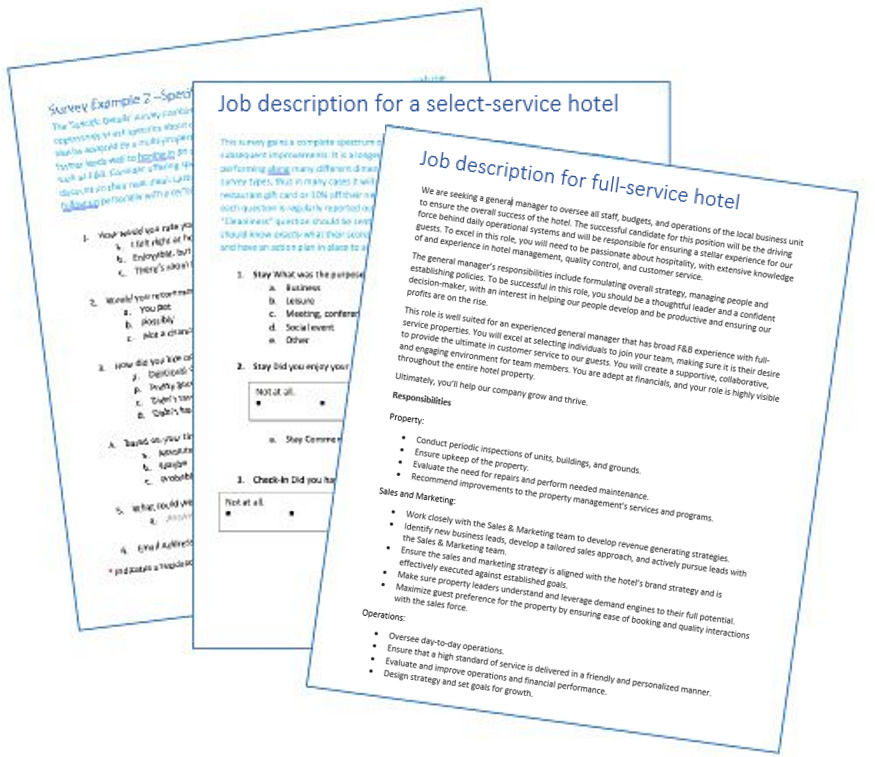The Ultimate Hotel General Manager’s Guide
New to the hotel manager role or seeking fresh insights? Dive into our curated resources, tailored specifically to empower you in maximizing hotel performance.
On this page you'll find:
What is a hotel general manager (or GM)?
Today the role of the Hotel General Manager (or GM) is often all-encompassing. He or she holds the ultimate responsibility for oversight of a property, including all sales and marketing, operations, events, maintenance, and customer service. As the era of digital transformation and an intensifying focus on guest personalization continues, the general manager role will evolve as well.
A Hotel Manager is often referred to as a General Manager, or just Manager for short. A day in the life of someone in hotel management can vary greatly, with responsibilities ranging from managing overall revenues and budgets, communication and coordination with staff and ensuring the property meets changing regulations and procedures.
Typically, a hotel manager is a great communicator and able to work well and take decisions under pressure.
How to become a hotel general manager?
Becoming a hotel general manager is a challenging but rewarding career path. A hotel general manager is responsible for overseeing all aspects of a hotel’s operations, from managing staff to ensuring customer satisfaction. If you’re interested in pursuing a career as a hotel general manager, here are the steps you should follow:
1. Obtain the necessary education
While a degree in hospitality management is not always required, it can be beneficial to have one. Some common degrees in the hospitality field include a Bachelor’s in Hospitality Management, Tourism Management, or Business Administration. These degrees provide you with the knowledge and skills necessary to be an effective hotel general manager.
2. Gain experience in the hospitality industry
One of the most important things you can do to become a hotel general manager is to gain experience in the hospitality industry. Starting at the bottom, perhaps as a housekeeper, front desk clerk or food service worker, will give you a good understanding of the inner workings of a hotel. Working your way up to positions such as front office manager, food and beverage manager, and director of sales will give you a well-rounded view of the hotel’s operations.
3. Build a strong network
Building a strong network in the hospitality industry is essential. Networking can help you learn about job opportunities, meet industry professionals, and gain valuable insights into the industry. Attend industry conferences, join professional organizations such as the Hospitality Sales and Marketing Association International (HSMAI), and engage with other professionals in the field.
4. Develop essential skills
To be a successful hotel general manager, you’ll need a wide range of skills. These include communication skills, leadership skills, problem-solving skills, financial management skills, and customer service skills. You should be able to effectively communicate with staff, guests, and vendors. You should also be able to lead and motivate a team, identify and solve problems quickly and efficiently, manage finances, and provide excellent customer service.
5. Look for job opportunities
Once you have the necessary education and experience, it’s time to start looking for job opportunities. Check job boards, industry websites, and hotel chain websites for job postings. You can also work with a recruitment agency or attend job fairs to find potential job opportunities.
6. Prepare for interviews
Preparing for job interviews is essential. Research the hotel you’re applying to and learn as much as you can about their operations, culture, and values. Prepare answers to common interview questions and be ready to provide examples of your experience and skills.
7. Continuously learn and improve
Once you become a hotel general manager, your learning and development shouldn’t stop. The hospitality industry is constantly evolving, and you need to stay up-to-date on the latest trends, technologies, and best practices. Attend industry events, read industry publications, and seek out opportunities for professional development.
Becoming a hotel general manager takes time, dedication, and hard work, but it’s a rewarding career that offers many opportunities for growth and advancement. By following these steps, you can increase your chances of achieving your goal and becoming a successful hotel general manager.
How to become a successful hotel general manager?
Skills and traits to become succesful
Becoming a successful hotel general manager requires a combination of education, experience, and personal qualities. A hotel general manager´s role is often all-encompassing and he or she must be able to manage company goals for several departments and need to have practical communication skills to work with employees throughout the company.
The Hotel General Manager also requires strong leadership skills to manage resources and dynamic organization skills to maintain daily operations. All in all, he or she holds the ultimate responsibility for oversight of a property, including all sales and marketing, operations, events, maintenance, and customer service.
As a general manager, every day is different and your versatile role often requires wearing several hats, from understanding operations, overseeing events, and delivering exceptional customer service. To help you be the best general manager you can be, we’ve put together a series of traits. These include:
- Being creative: a successful general manager should be able to avoid inertia and think outside the box.
- Analyzing and understanding data: in order to achieve success, a general manager shouldn’t just review the data but should be able to analyze it and extract insights and takeaways.
Find below more traits that can help take you from a good to a great general manager:
- Inspirational – As with any great leader, it’s imperative that a General Manager do more than just manage. The GM needs to be someone that people want to follow and work their hardest for. An inspirational leader will bring out the best characteristics in his or her team. Having a happy and pleasant team is even more crucial in hospitality than in other sectors, and driving that enthusiasm, passion, and hustle comes from the top. Here are 3 strategies to reduce hotel employee turnover and to build a happier, more engaged team.
- Decisive – No matter the size of the property, a General Manager has to make decisions on the fly for all kinds of situations and with a calm exterior. The GM owns responsibility for the successes and failures of a property, and while he or she should positively empower the management team to make their own decisions, there will always be situations requiring special attention. Whether it’s working with the teams to help them make the best decisions for guests quickly or calling the shots herself, no GM is going to succeed if she can’t think on her feet in this fast-paced and constantly accelerating environment.
- Analytical – There are a lot of reports and financials to be considered in the hotel industry and that’s only likely to continue to grow exponentially as data is available and can be aggregated across various systems. A GM needs to work with the team to quickly review, understand, and action on data he sees on a daily basis. There is a constant pivot to make rates and packages appealing to the right guest or planner at the right time, not just based on local competition, but on a hotel’s unique offering. Seeing not just numbers, but patterns and trends will become even more necessary to be successful in this role.
- Creative – While we often hear that people tend to be either analytical or creative, the future GM needs to be both. Budgets aren’t growing, but the expectation of the guest is. A GM needs to be able to digest the data with an analytical mindset and then shift to a creative mindset to problem solve in unique ways. Not only that, creativity from leadership is the only way to truly create a novel experience at a property that both guests and planners will seek out and pay a premium for.
- Adaptive – Despite the other traits, if a General Manager is hard-headed and stuck in her ways, she won’t be successful. There is too much change in the hotel industry and really all around us at all times when it comes to technology and expectations to not be open to change. We never know when the next big OTA will pop up and affect our bottom line or when the next social media channel will change how we advertise and communicate. A General Manager needs to be bold and willing to try new things while being smart enough to change course if those trials aren’t performing well. Having a plan is important, but sticking to the plan isn’t paramount to success. Being open-minded will serve the future GM well.
- Visionary – A General Manager sets the goals and strategy for a hotel. In order to set his property apart, the GM needs to constantly evaluate the competition, market, region, and audience. Beyond that, he needs to look to the future and envision how the property will be perceived and operate in 5 to 10 years and then determine what will be needed to achieve that vision. An excellent General Manager needs to keep a pulse on not just the hotel industry, but also the technology industry and how guests are buying and communicating outside of their travels and group business. To truly achieve success in the future, the GM will need the visionary trait, always thinking to the future for planning, budgeting, and improving the overall experience of a property – understanding what a guest wants before the guest even knows.
- Constant learner: Stay up-to-date on hospitality industry trends: The hospitality industry is constantly evolving, so it’s essential to stay informed of the latest trends and best practices. Attend industry events and conferences, read industry publications, and network with other professionals to stay informed.
- Focus on guest satisfaction: Guest satisfaction is critical to the success of any hotel. Make sure to prioritize guest needs and expectations, and focus on providing exceptional customer service.
Hotel general manager frequently asked questions (FAQs)
What are the key skills needed to be a successful hotel general manager?
A successful hotel general manager must possess a unique blend of skills, including strong leadership, excellent communication, financial acumen, and a deep understanding of customer service. Adaptability and problem-solving skills are also essential, as the hospitality industry is dynamic and constantly evolving.
How does a hotel general manager contribute to guest satisfaction? A hotel general manager plays a pivotal role in guest satisfaction by ensuring high standards of service, addressing guest concerns promptly, and constantly seeking ways to enhance the guest experience. This role involves overseeing all departments to ensure they work in harmony to deliver a memorable stay for guests.
What is the typical career path to becoming a hotel general manager?
The journey to becoming a hotel general manager typically involves gaining extensive experience in various hotel departments, such as front desk operations, housekeeping, and food and beverage services. Many successful managers also hold degrees in hospitality management and have progressed through roles like department manager or assistant general manager.
How does a hotel general manager stay informed about industry trends?
Staying informed is crucial for a hotel general manager. This involves regularly attending industry conferences, participating in professional hospitality associations, engaging in continuous learning through courses and certifications, and staying updated with hospitality publications and reports.
What are the biggest challenges faced by hotel general managers today?
Hotel general managers today face challenges like adapting to changing guest expectations, implementing new technologies, managing online reputation, ensuring staff training and retention, and navigating economic fluctuations that impact the hospitality industry.
How important is digital marketing in a hotel general manager’s role?
Digital marketing is increasingly important for hotel general managers. It involves overseeing the hotel’s online presence, including managing the website, social media, and online reviews. A strong digital marketing strategy can significantly enhance the hotel’s visibility and attract more guests.
Can a hotel general manager impact the hotel’s financial performance?
Absolutely. A hotel general manager directly impacts the financial performance by developing effective strategies for revenue management, controlling costs, optimizing operational efficiency, and driving sales through innovative marketing and customer engagement strategies.
These FAQs aim to provide detailed, credible information for those interested in the role of a hotel general manager, offering insights into the skills required, career progression, and challenges in the field.
Key Hospitality Acronyms
In the world of Hospitality, we’re faced with different terms every day of our business. Whether you’re front of house, back-end, or something in between, there’s a few key terms we should all be aware of. Some of the most common ones you may encounter include Average Daily Rate (ADR), PMS (Property Management System) and GDS (Global Distribution System).
If you want to access a complete hotel abbreviations dictionary, check out these Hospitality Acronyms Defined.
Guest welcome letter templates
In today’s competitive environment, the right first impression can go a long way to increasing guest engagement and loyalty. One of the ways you can start their stay off on the right foot is by creating welcome letters. These can be used to provide:
- Additional information about a guest’s stay, including relevant facilities or recognition for repeat guests
- Increased communication, both during and after their stay
- Relevant health & safety guidelines or tips
Welcome letters can be especially powerful tools to help guests feel that you are personalizing their experience. Another good tip is to sign off the letter from your hotel General Manager to give it that personal touch.
In this blog, we share more details on what to include in your hotel’s welcome letter, as well as three free templates to download and begin using at your property.
Guest Management email templates
In the same way that welcome letters can go a long way to increasing communication, and ultimately enhancing the guest experience, with over 4 billion daily email users, this is one marketing strategy not to be miss. Many hoteliers often under appreciate the value of a well-structured email to communicate with guests before, during and after their stay. These emails can then be automated using your Guest Management System.
Some of the best practices to follow when creating emails include:
- Relevant copy and information
- A clear call-to-action for readers to take
- Clear layout with a balance between images and text
Find out more about how to create effective emails for different needs.
RevPAR: What is it, and why is it important?
RevPAR stands for Revenue Per Available Room. It is a useful measure for hoteliers to understand the overall success of their property. When understood correctly, it can help to inform important decisions across your business, including how to manage your Revenue Management Strategy. Particularly during COVID-19, many hoteliers have faced new challenges for how to maximize the value of every guest.
Find out more about what it is, how to calculate RevPAR and other alternatives to RevPAR, such as TrevPAR in this blog.
An overview of Banquet Order Templates and how to use them
Banquet Order Templates are commonly referred to as BEO, or just event order. If you are a property with event space and are offering this space to event planner, it’s essential that you receive the necessary information to deliver on expectations. This may include important dates, catering requests and more. In this blog, we share all of the details of what to expect from a BEO, and answer the most common questions that arise for hoteliers when dealing with BEOs.
One of the event management challenges we commonly hear from hoteliers is that it can be time consuming to implement new processes. Luckily, there are many tools at your disposal, such as this complimentary BEO template we’ve created. And in case you’re ready to invest in technology to improve your operations overall, take a look at the Amadeus Sales & Catering software.








